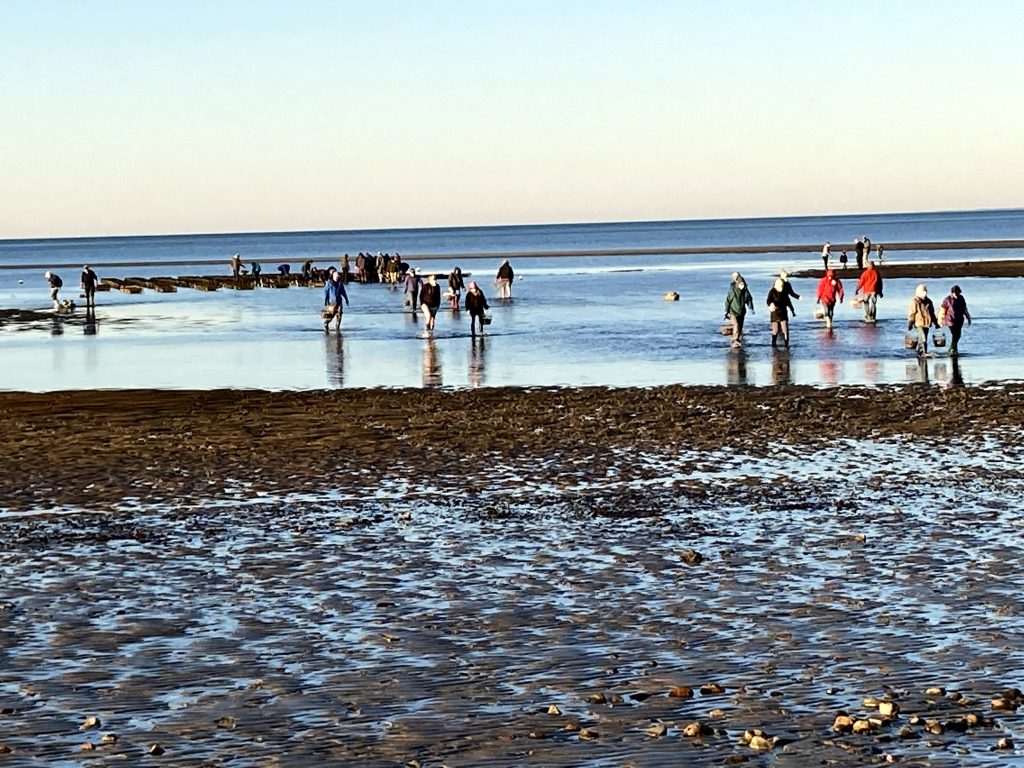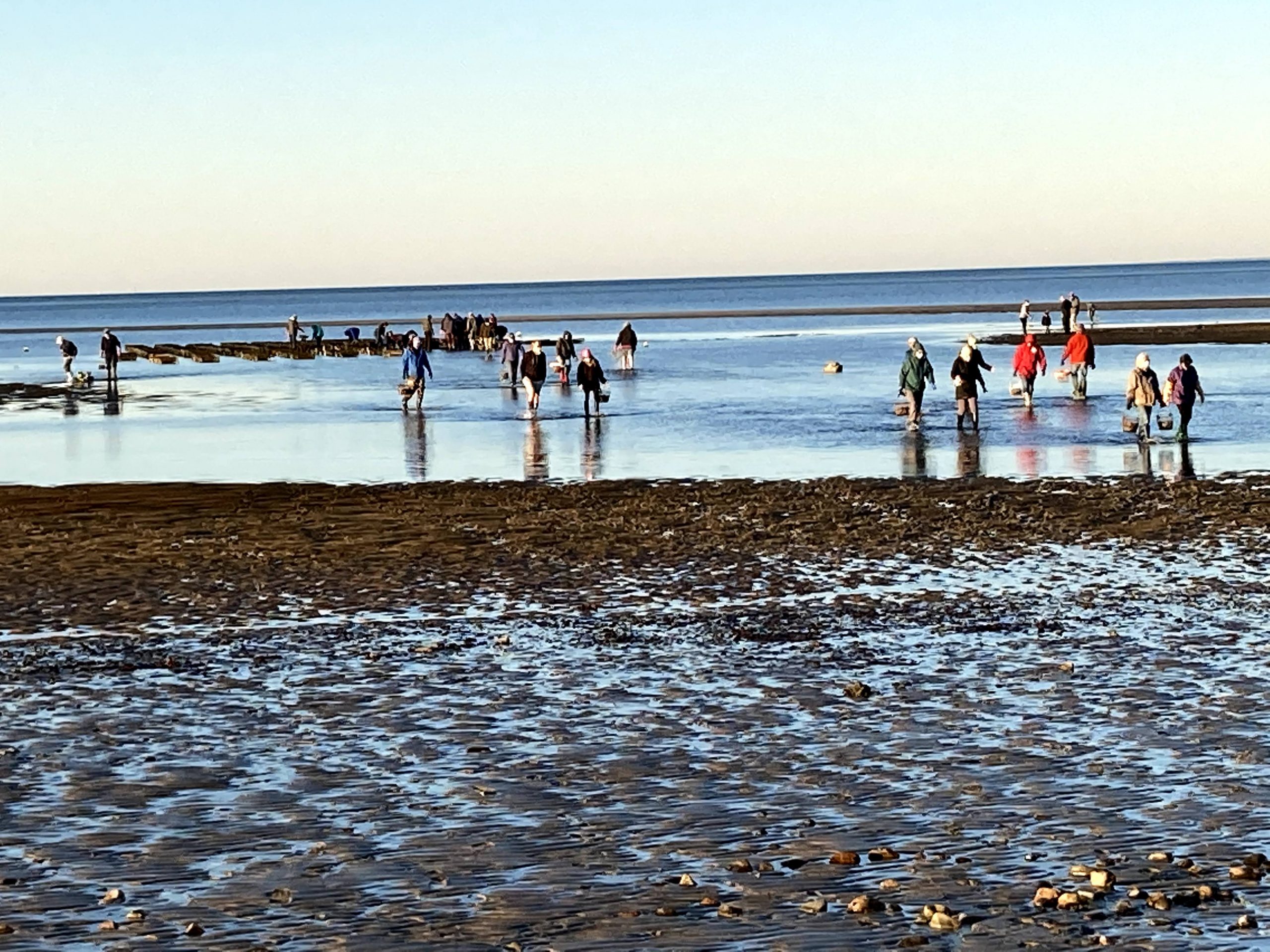Community Effort Provides $79,950 in COVID-19 Related Rapid Response Grants to Support Massachusetts Municipal Shellfish Initiatives


Woods Hole, MIT Sea Grant Programs lead effort with assistance from Barnstable County Cape Cod Cooperative Extension, Cape Cod 5, and Massachusetts Oyster Project to benefit both recreational and commercial fisheries across region.
The Woods Hole and Massachusetts Institute of Technology Sea Grant programs recently led an effort resulting in $79,950 in COVID-19 related rapid response grants to nine Massachusetts towns to assist with municipal shellfish propagation efforts impacted by the pandemic.
The funding for shellfish and natural resources departments was also aimed at assisting the shellfish aquaculture industry because shellfish growers experienced a loss of sales during the crisis, according to Harriet Booth, marine resource specialist at Woods Hole Sea Grant and Cape Cod Cooperative Extension.
“Due to the pandemic, municipal shellfish propagation programs have not only experienced budget cuts and reduced labor, but there has also been an increase in recreational shellfishing activity across the board,” Booth said. “This funding was a great opportunity to support these programs in ways that could be tailored to individual towns’ needs, helping the towns bolster local shellfish resources that community members rely on as a source of food and recreation, especially during these challenging times.”
Matching funds for the entire effort were provided by the participating towns as well as $5,000 from Cape Cod 5 and $5,000 from the Massachusetts Oyster Project.
The funding provided included:
- $10,000 for the Town of Barnstable, Marine and Environmental Affairs Department to purchase oysters from Barnstable shellfish growers;
- Brewster Department of Natural Resources received $7,450 to purchase oysters and quahogs from Brewster shellfish growers & purchase shellfish seed;
- $10,000 for the Town of Chatham Shellfish Division to purchase oysters from Chatham shellfish growers and purchase quahog seed;
- $5,000 for the Town of Eastham-Natural Resources Department to purchase oysters from Eastham shellfish growers and purchase quahog seed;
- $7,500 for the Edgartown Shellfish Department for the construction of an upweller for shellfish seed and $5,000 to purchase oysters from shellfish growers;
- Gloucester Shellfish Department received $10,000 for a softshell clam netting project;
- $10,000 for the Town of Truro, Shellfish Department, to purchase oysters from Truro shellfish growers and purchase shellfish seed;
- $5,000 for the Yarmouth Division of Natural Resources to purchase oysters from Yarmouth shellfish growers;
- $10,000 for the Wellfleet Shellfish Department to purchase oysters from Wellfleet shellfish growers.
“Addressing food security in our region continues to be a focus of Cape Cod 5’s community engagement efforts, especially given the effects of the pandemic,” said Dorothy Savarese, Chair and CEO of Cape Cod 5. “We are proud to provide funding for this collective effort to leverage sustainable sources of food for members of our community, while supporting the shellfish industry in our region, which we know is an important part of our local economy.”
Andrew Hultin of the Massachusetts Oyster Project said the organization, which is dedicated to the restoration of water-cleansing oysters and native shellfish to the state’s estuaries was “pleased to work with the MIT and Woods Hole Sea Grant programs, the Town of Wellfleet and other partners on this important grant program that will support our local shellfishing industry and coastal ecosystems.”
Danny Badger, Marine Extension Specialist at MIT Sea Grant, said Massachusetts shellfishing communities have been hit hard by the pandemic in diverse ways.
“Given the conditions unique to each of the Commonwealth’s municipalities, we wanted to ensure that these funds were applied to support a range of stakeholders,” he said. “(That includes) shellfish growers and harvesters whose market demand evaporated with the shut-down of restaurants, recreational harvesters who increasingly rely on municipally managed shellfish populations for food, and many others through projects tailored to, and maximized for, each community.”
Badger added that the entire effort was a credit to the commitment to coming together for solutions from a wide range of stakeholders.
“We are so appreciative of the Mass Oyster Project, Cape Cod 5, Barnstable County, and the towns themselves for providing matching funds and elbow grease to magnify the benefit for stakeholders across the board, and to ensure that these communities remain resilient and robust,” he said.
